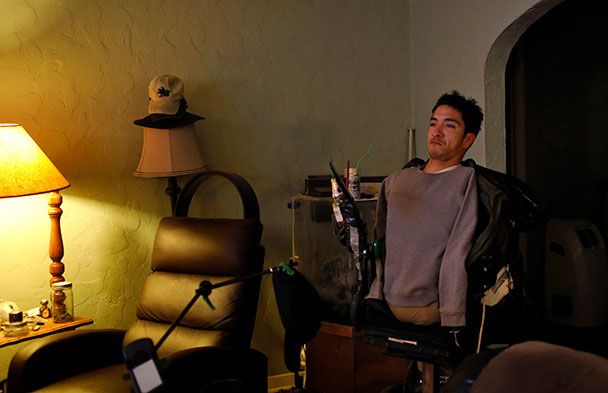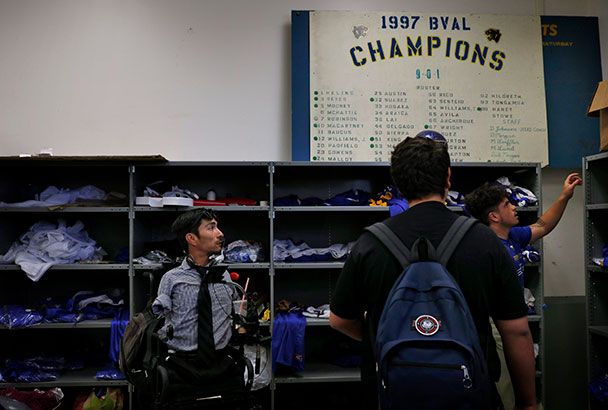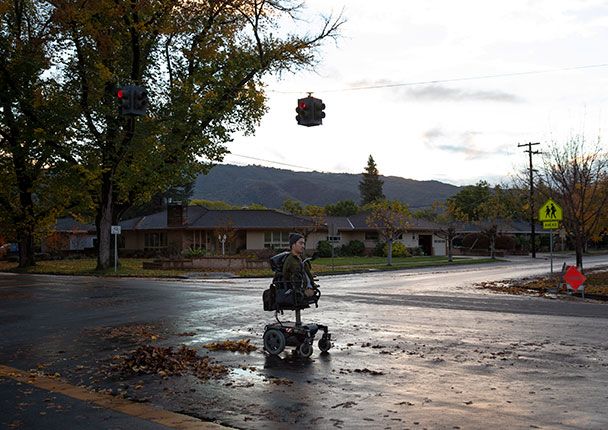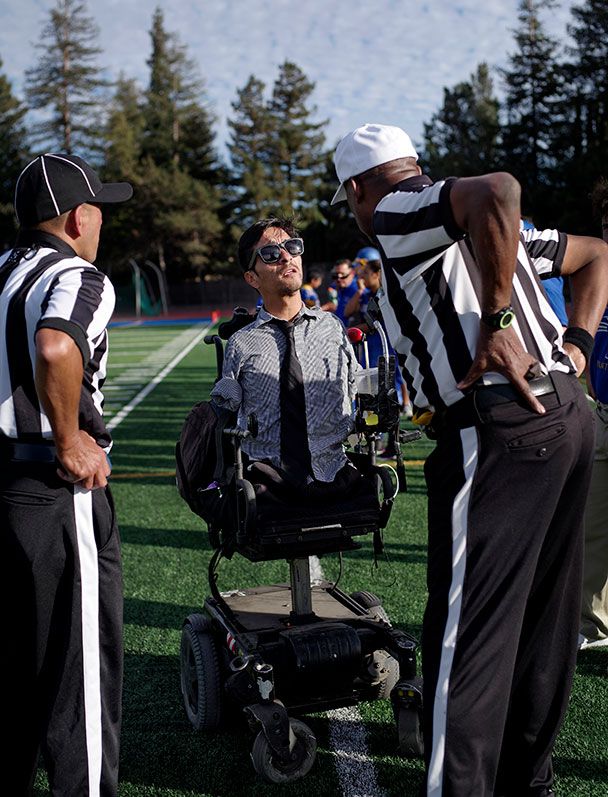4:02 am | February 16, 2019 | Go to Source | Author:
MENDEZ’S WHEELCHAIR NEVER sits still, but the way it pinballs back and forth between the hashmarks on the Prospect practice field says the coach is not happy. It’s the second day of the team’s sleep-at-school preseason camp, and the coach is trying to install one of his favorite plays: the 37 stretch.
His team is a mix of freshmen and sophomores, some with a bit of experience, most with little to none. The school sits on the western edge of Silicon Valley, just 5 miles from Apple’s campus. Its classrooms are a melting pot of haves and have-nots. Minorities make up 73 percent of the student body. And 26 percent are economically disadvantaged.
When the players met their new coach, the whispers began. How could someone who had never held a football teach a freshman how to throw, tackle or block? One player quit because of Mendez. But those who stayed learned about their new coach. He demanded respect, eye contact and accountability. He talked about building a family. Encouraged the group to play for their teammates. And ended each practice with the same message: I love you guys.
On this day, one of his freshman quarterbacks struggles to grasp the footwork on the 37 stretch. Mendez tries to explain, but the kid doesn’t get it. Three other players start chitchatting between reps. Mendez loses it.
“Get over here!” he yells. “Let’s go!”
The team jogs over and surrounds him. An assistant coach holds a whiteboard a few inches in front of Mendez. The quarterback removes the cap from a blue dry erase pen and puts it in Mendez’s mouth. With the pen, Mendez draws the X’s and O’s of what the play is supposed to look like and why.
“It’s 37 stretch, right? We’re going to fake it this way and then waggle out,” he says. “But we really have to sell that we are going that way. They have to buy the fake. Otherwise it won’t work. Make sense?”
“Yes, Coach,” the quarterback says. “I got it. I know what you’re saying. I’m sorry.”
“You don’t need to apologize,” Mendez says. “Just focus — you got this.”
The players jog back to their positions. They run the play again. This time it’s flawless.
“There you go!” Mendez screams. “That’s what I’m talking about!”

Mendez struggles to deal with back and neck pain from spending all day in his chair. Preston Gannaway for ESPN
IN HIS 30 years, Mendez can’t recall a single dream in which he has had arms or legs. It’s an image his brain can’t compute. There have been opportunities over the years to pursue prosthetic limbs, but he has turned them all down. He says he would consider prosthetics only if he ever became a father. As much as he doesn’t want this syndrome to define him, at the same time there’s a part of him that loves the fact that it sort of does.
“I like the way I am, really,” he says. “It brings out the best in people. I’m in Las Vegas and there’s some guy stumbling drunk, looks like he was just in a fight. He sees me, and he stands up straight and pulls himself together so he can open the door for me. Things like that happen all the time. It gives me hope for the world.”
But those experiences come at great cost. Most days Mendez has chronic neck, back and shoulder pain. “I use my neck like my arm,” Mendez says. “And the muscles in your neck are not supposed to be used that often. At the end of every day, I’m sore.”
Mendez operates his cellphone, attached to a stand on his wheelchair, with his nose and lips. He draws and writes with his mouth. In his chair, he is constantly shifting, twisting and adjusting his posture. On warmer days, he can get bed sores from sitting in the same position too long. He has scoliosis, which makes his spine look far more like an “S” than the “I.” And because of Rob’s lack of limbs, his father says he retains 30 percent more heat than someone who has arms and legs. When he’s away from home, he’s careful about what he eats and drinks, often keeping it to no more than an iced coffee. Otherwise there’s the potential he’ll need to use the bathroom without McAvoy there to help him.
He hates talking about any of this.
“Complaining is my No. 1 poison,” he says. “So I try to stay positive. You hear stories about people with cancer, fighting for their lives. I’m fighting to have something to drink. To feel comfortable. So I try not to complain. It doesn’t lead to a good place. It just makes me mad.”
McAvoy has been Mendez’s caretaker for the past six years. Every morning, he helps with just about everything. Going to the bathroom. Taking a bath. Brushing teeth. Combing hair. Getting dressed. Shaving. Eating breakfast. And buckling Rob into his chair. Once buckled, Mendez says he feels unstoppable.
“You know how Ironman gets in his suit and he just starts flying everywhere? That’s how I feel in my chair,” he says. “It gives me this sense of independence.”

Mendez acknowledges that his presence has had a positive impact on people. “But I don’t think about this the same way everybody else does,” he says. “It’s just me.” Preston Gannaway for ESPN
THE DAY AFTER teaching his quarterback the 37 stretch, Mendez sits under the lights at the Prospect 50-yard line, exhausted. It’s almost midnight. He wanted to leave by 9 p.m., but one conversation led to another. Now the entire Prospect program circles around Mendez at midfield. He tells the story of his father putting him on the stairs when he was 9 years old, demanding that he climb to the top. Rob would set his chin on the ledge of the next step and use that to lift his entire body. It took him more than a half hour – sometimes two steps up, one step down — but he did it.
“You have to believe,” he says. “Think about it. What do you want out of this year? What do you want people to say about this team? How are you going to get there?”
After his speech, Mendez asks for a ride home. The battery on his wheelchair is dead, and he wants to charge it at school overnight. I lift him out of his chair and carry him to my car, buckling him into the passenger’s seat.
As we head back to Gilroy, I ask Mendez if he’s aware of the impact he has already had on Prospect players and coaches like assistant Todd Livingston. Livingston told me Mendez’s presence is living proof of what humans are capable of. Mendez shakes his head. “I know that’s there,” he says. “But I don’t think about this the same way everybody else does. It’s just me. I don’t focus on it.”
He acknowledges that the attention is often uncomfortable. He’s had people who hear his story and then approach him in tears. “How in the world am I supposed to handle that?” he says. “I just try to shut it down as quickly as possible.”
I mention that one of the themes I’m thinking about for his story is this idea of a beautiful mind. He immediately snaps.
“No, no, no,” he says. “I’m not going to let that happen. I’m not beautiful at all. I don’t want to be put on a pedestal. I just want to be Coach Rob. Coach Mendez. I love that. I don’t sign up for being inspirational Rob.”
But it isn’t that simple. The more successful Mendez is at proving he’s just like everyone else, the more people put him on that pedestal, peg him as an inspiration and treat him, well, different from everyone else. I think back to something his pediatric physical therapist told me.
“When someone is born this way, this is their world,” Dr. Benjamin Mandac says. “They don’t have the grief of losing a limb because they never had it. It’s society that imposes that grief. We’re the ones who feel sorry for them and say, ‘Oh you poor thing.’ They just want to move, explore and live. Rob is no different.”
The green mile marker signs fly past on Highway 101. Mendez is hungry. Tired. He needs to use the bathroom. And he doesn’t like the idea I have for framing his story. He says if he had arms and legs he has no idea how his life would be different. I ask whether that thought bothers him. And just like that, the man who so often projects like everything is fine rips off his facade.
“Yes!” he says. “Let’s get to the bottom of it. I’m lazy. I haven’t graduated college yet. I should have a wife by now. I know I’m good for the kids. I love the feeling when I lift kids up. But I’m 30 years old and a JV high school football coach. It’s an accomplishment to the public because I have no arms and legs, but the reality is I’m not accomplished. And yeah, of course that’s frustrating.”
I tell him that’s the most honest he’s been in our time together. But I don’t know what else to say. For the last few minutes of our ride, we both keep quiet. When we pull into the driveway, McAvoy comes out and carries Mendez into the house. As they head inside, Mendez looks back at me over McAvoy’s shoulder.
“I’m sorry,” he says. “I guess you saw a little bit of the other side tonight. This life … it just isn’t always easy.”

Mendez makes a trip to a nearby shopping center for coffee. Preston Gannaway for ESPN
LESS THAN TWO weeks before his son’s first game as a head coach, Bob Mendez prepares to drive Rob home after Sunday family dinner. He briefly leaves Rob in the garage to run inside. Rob leans forward in his chair to reach his cell phone. It’s a move he makes countless times a day. But this time, he has no idea the belt around his waist isn’t buckled. He tumbles forward. There is nothing to break his fall. He turns his face to the right, pulls his head back and prays. The left side of his face slams into the concrete floor of the garage. Bob hears the sound from a few feet away.
“It was just … it was horrible,” Bob says. “Like a pancake hitting the ground. A 10-story building hitting the ground. I swear I buckled him in. I swear. I turned around, took two to three steps and then I heard it.”
It isn’t the first time Rob has fallen out of his chair. It happened at the end of his senior prom, when he tipped over the wheelchair ramp as he and his classmates were leaving. His father has long wished that Rob would wear an upper belt as well as the one that wraps around his waist. But Rob refuses because the upper belt limits his ability to access his phone and draw plays.
“Anything in the world that is worth doing, he’s done it with his mind,” Bob says. “And you’re risking it all by not wearing an upper belt.”
This is one of the worst falls. Blood runs everywhere. Bob rushes his son to the hospital. Rob has fractured cheek and orbital bones and has the effects of a concussion. Doctors recommend surgery. They tell Rob he can’t coach for at least four weeks. He doesn’t listen. That night he can’t sleep. He can barely open his mouth. The next day he spends almost entirely in bed, unable to open his eyes.
By Tuesday afternoon, he’s back at Prospect for practice, apologizing to his players for Monday’s absence. When his players ask what happened, he tells them he got into a fight with the pavement.
“I’m pretty good at dealing with pain, and I didn’t want to stay home feeling sorry for myself,” he says. “If I can go out there and power through four or five hours, then I’m OK.”
Says McAvoy: “That’s just him. He can be stubborn. He doesn’t eat right. He doesn’t listen to the doctors like he should. But he’s always there for the kids. He says they need him, but you know what? I think he needs them just as much.”

Physically, Mendez is unlike any other high school football coach in the U.S. Mentally and emotionally, he’s no different. And that includes getting on the officials when something doesn’t go his way. Preston Gannaway for ESPN
THREE MONTHS AFTER we first met, Mendez and I are in another bar, this time in downtown Campbell. It’s the Friday night before Halloween. The World Series is on television. Mendez picks a spot at the bar next to two women. In less than a minute he introduces himself, then me and strikes up a conversation.
In the morning, he will coach the biggest game of his young career. Some might suggest he should be home, resting. But here, he’s in his element. Holding court, triggering laughs and helping people realize for a few minutes that a man in a wheelchair without arms and legs is just like anyone else.
“I’m not afraid to be myself,” he tells me later. “I wish more people were like that. If I’m sitting there and don’t smile or say hello, I just feel like that’s rude.”
The season has been a greater success than Mendez could have imagined. His greatest fear was failure. But after losing the season opener to Santa Clara, his Panthers won seven games in a row. Along the way, Cable invited Mendez’s two best players to move to varsity. They chose to stay with him.
In a little more than 12 hours, Prospect will play for the league JV championship. The school they will face, Ann Sobrato, fired Mendez as an assistant three years earlier. “Said they wanted to move on without me,” Mendez says. “In a text message.”
Sobrato is located across the street from his parents’ home in Morgan Hill. On convenience alone, it would have been the perfect place for him to coach forever. Now comes the opportunity to prove the school made a mistake.
“The Super Bowl of JV football,” he says.
Powered by WPeMatico


